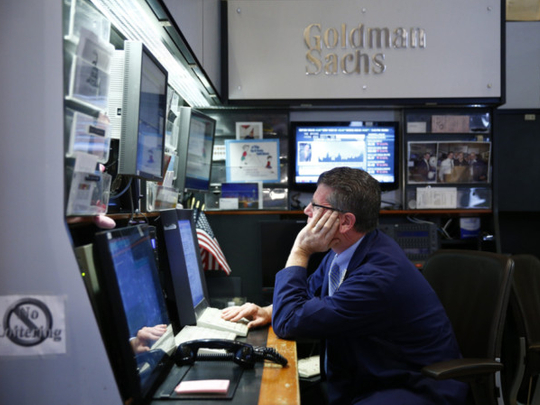
New York Goldman Sachs and Morgan Stanley are in preliminary discussions with the Department of Justice over allegations they mis-sold mortgage-backed securities — a cloud over banks in a week that Bank of America agreed to pay a record penalty over similar allegations.
On Friday Goldman agreed to pay $1.2 billion to resolve a related action from a different US government agency, the Federal Housing Finance Agency, which alleged it had sold bad mortgage-backed securities.
The DoJ is turning to other banks after its record settlements with JPMorgan, which paid $9 billion, Citi, which paid $7 billion, and this week’s highest-ever settlement with a single institution — the $16.65 billion paid by BofA.
People familiar with the matter said officials are still gathering evidence from Goldman and Morgan Stanley and negotiations and potential deals are still some way off.
If the two investment banks ultimately reach a deal with the DoJ, they will probably agree to different settlement terms because — unlike BofA and JPMorgan — neither bank was a big mortgage originator.
The DoJ obtained $13 billion in total consumer relief from the three previous settlements in the form of modifications of existing mortgages or refinancing. Because Goldman and Morgan Stanley are investment banks, they cannot easily provide relief to strapped homeowners, so they may end up financing new construction. It is also possible the banks will balk at the DoJ’s demands and elect to go to trial.
Though costly for Goldman, the FHFA settlement is in line with that reached by other institutions as a percentage of securities issued. Banks negotiating with both the FHFA and the DoJ complain that the latter is much more of a “black box”, making it much harder to estimate final settlement costs.
After the crisis, Goldman was an early target for regulators, prosecutors and politicians but it subsequently enjoyed a quieter time as the spotlight shifted to JPMorgan and BofA — the biggest issuers of MBS.
The settlement is more than double the $550 million landmark 2010 deal with the Securities and Exchange Commission, which at the time was considered a big penalty for behaviour related to the financial crisis. That agreement has since been dwarfed by multibillion-dollar settlements between the US government and JPMorgan Chase, Citigroup and Bank of America.
The FHFA has now wrung more than $20 billion out of the banks. Goldman was one of only four institutions still being pursued by the FHFA, which sued 18 institutions in 2011, accusing them of misrepresenting the quality of securities sold to Fannie Mae and Freddie Mac. The remaining holdouts are Nomura, HSBC and Royal Bank of Scotland.
“We are pleased to have resolved these matters,” said Gregory Palm, Goldman’s general counsel.
Fourteen other banks settled earlier, concluding that a series of adverse legal rulings made it unlikely that they could get the case dismissed or win at trial.
In its lawsuit, the FHFA said Fannie and Freddie bought $11.1 billion of mortgage-backed securities from Goldman, unaware that “significant percentages of the underlying mortgage loans ... had materially poorer credit quality than was represented in the registration statements”.
— Financial Times












